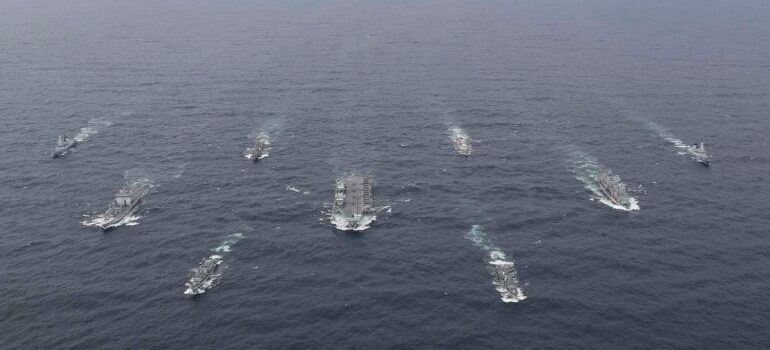
| No. 14 | June 14, 2021 |
|
CONTENTS 2021 NATO Summit • Ongoing Threat to World Peace from Cold War Relic - Nick Lin - • China as a Threat and the Fraud of NATO's Values - Margaret Villamizar - •
As U.S. Steps Up War Preparations
Against China NATO - Steve Rutchinski and Philip Fernandez -
• Law of Uneven Development and
Calculating - Ideological Studies Centre - 2021 NATO Summit Ongoing Threat to World Peace |
|
The 2021 summit of the North Atlantic Treaty Organization (NATO) takes place at its headquarters in Brussels, Belgium on June 14, bringing together the heads of state and government of its 30 member countries.[1] Summits are meetings of the North Atlantic Council, NATO's principal political decision-making body, at its highest level. They are not held regularly but, according to NATO, at important junctures in its decision-making process, to address issues "of overarching political or strategic importance" such as when a new policy is introduced or a major initiative launched. The last summit was held in July 2018.
 In
the recent period, with the end of the bipolar division of the world,
the U.S. imperialists who dominate the aggressive alliance have sought
to provide an ongoing justification for
NATO's existence as an instrument to advance their aims in the new
conditions.
In
the recent period, with the end of the bipolar division of the world,
the U.S. imperialists who dominate the aggressive alliance have sought
to provide an ongoing justification for
NATO's existence as an instrument to advance their aims in the new
conditions.
At a time when the U.S. claims that China and Russia pose a threat to global stability, NATO is using these countries as the pretext to demand increased war funding from member governments.
Another important aspect of the summit is how NATO is further insinuating itself into the political and social affairs of member countries and the direction of their economies to serve its aggressive aims. This is happening when more than ever peoples the world over are affirming their right to be the decision-makers in all matters that affect their lives and continue to reject the use of force to sort out differences between nations and peoples.
NATO is attempting to give itself a progressive and democratic veneer as a benevolent political actor, saying that it consults with experts, youth, civil society and the private sector to set its direction, that all its decisions are made by consensus, and that it supports a rules-based international order. Meanwhile, it demands increased military spending from its member countries in contradiction with the people's wishes, and allegiance to its "shared values" to the extent that criticism of NATO and its warmongering are to be deemed acting in the service of foreign powers, by which it usually means Russia and China.

Anti-NATO protest in Brussels, June 13, 2021
In an article discussing the agenda of its 2021 summit, NATO says this year's summit is "a pivotal moment for the Alliance and for collective security. In an age of geopolitical competition, Allies are stepping up in response to the challenges of today and tomorrow. These include Russia's pattern of aggressive behaviour; terrorism; cyber attacks and disruptive technologies; the rise of China; and the security implications of climate change."
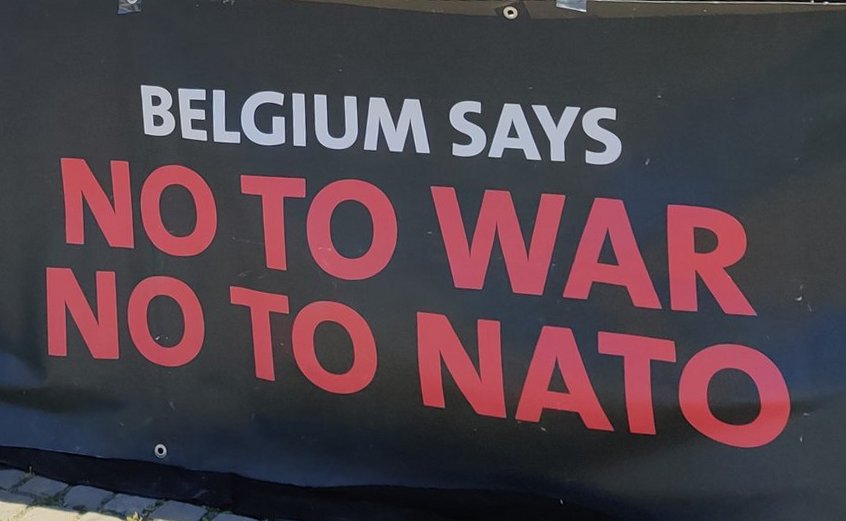 As
if NATO is not the creation of the U.S. in the first place, under U.S.
command at all times, the media report Biden has given it unequivocal
U.S. backing, as opposed to Trump who was floating the idea of
dispensing with it altogether and not wasting any time permitting U.S.
allies to make trouble expressing their contradictions. "The United
States is fully committed to our NATO alliance, and I welcome your
growing investment in the military capabilities that enable our shared
defences," U.S. President Joe Biden told an online session of the
Munich Security Conference on February 19. He also confirmed the U.S.
commitment to NATO's so-called collective defence, adding, "An attack
on one is an attack on all. That is our unshakeable vow."
As
if NATO is not the creation of the U.S. in the first place, under U.S.
command at all times, the media report Biden has given it unequivocal
U.S. backing, as opposed to Trump who was floating the idea of
dispensing with it altogether and not wasting any time permitting U.S.
allies to make trouble expressing their contradictions. "The United
States is fully committed to our NATO alliance, and I welcome your
growing investment in the military capabilities that enable our shared
defences," U.S. President Joe Biden told an online session of the
Munich Security Conference on February 19. He also confirmed the U.S.
commitment to NATO's so-called collective defence, adding, "An attack
on one is an attack on all. That is our unshakeable vow."
With the U.S. back in the fold and that existential crisis averted, NATO claims that at this summit, "there is now a unique opportunity to strengthen the bond between Europe and North America, and prepare NATO for the future. This is why the NATO 2030 initiative to continue adapting the Alliance is at the heart of the Summit." NATO 2030 will be the main preoccupation for this year's summit.
Canada will be represented at the NATO summit by Prime Minister Justin Trudeau. A June 2 press release from the Prime Minister's Office states, "At the NATO Summit, Prime Minister Trudeau will join other leaders to recommit to working together to address future trans-Atlantic security threats and challenges, and to strengthen shared security commitments that keep our people safe." It adds that "NATO is a cornerstone of Canada's international security policy. It is the primary international forum in which to engage other nations on transatlantic defence and security."
This could not be further from the truth. None of the NATO Summit's agenda addresses the basic concerns of Canadians about having an independent self-reliant economy that can produce all that the people require, not one that is subservient to the needs of the U.S. war machine and war economy. NATO and its warmongering agenda are in direct contradiction with Canadians' desires for peaceful and friendly relations of mutual benefit with other countries, and for the use of actual diplomacy -- not coercive diplomacy that is the specialty of the U.S., that Canada also practices -- to sort out differences between countries. None of the summit agenda deals with the need for Canadians to have a say in all matters that affect their lives.
NATO is a Cold War relic that is a danger to humanity. What NATO refers to as preparing for the future only promises further destruction, despair and retrogression, not progress for humanity. Canada must get out of NATO and NATO must be dismantled.
Note
1. In 1949, there were 12 founding members of NATO: Belgium, Canada, Denmark, France, Iceland, Italy, Luxembourg, the Netherlands, Norway, Portugal, the United Kingdom and the United States. The other member countries are: Greece and Turkey (1952), Germany (1955), Spain (1982), the Czech Republic, Hungary and Poland (1999), Bulgaria, Estonia, Latvia, Lithuania, Romania, Slovakia and Slovenia (2004), Albania and Croatia (2009), Montenegro (2017) and North Macedonia (2020).
(With files from www.nato.int. Photos: C. Le Paige, L. De Brabander)
China as a Threat and the Fraud of NATO's Values
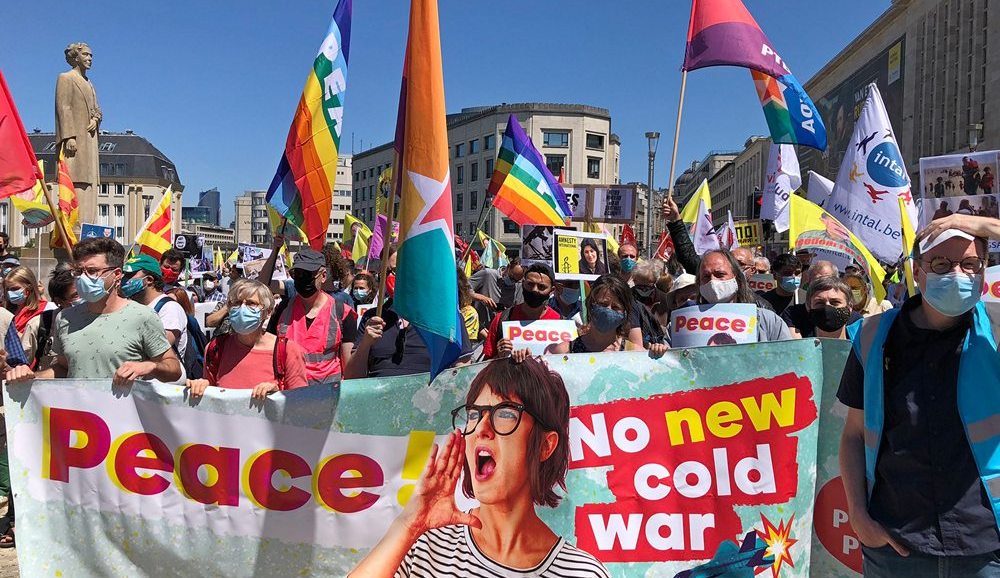
Brussels, June 13, 2021
At a meeting of NATO foreign ministers on June 1 in preparation for the Brussels summit, the alliance's Secretary General Jens Stoltenberg emphasized that NATO 2030 is about enhancing NATO's role in preserving the rules-based international order, which he said is challenged by authoritarian regimes, like Russia and China. He said this requires strengthening existing partnerships and building new ones, including in the Asia-Pacific, Africa, and Latin America -- in other words extending NATO's reach to regions far beyond the north Atlantic to China's own neighbourhood and regions where the U.S. is stirring up trouble by meddling and aggressively contending with China in particular for influence and markets.
At a June 4 event in Washington, DC, organized by NATO, the German Council of Foreign Relations and the Brookings Institution, where one of the main topics for discussion was China, Stoltenberg said the communiqué that will be approved at the summit will have "much more language on China than we have ever had before." He claimed NATO was not declaring China an adversary, but went on to paint it as a threat to U.S. global dominance, urging other members of the alliance to get on the U.S. bandwagon against China, in the spirit, if not the letter, of NATO's Article 5 on collective "defence" which says that an attack on any NATO member is an attack on all of them. This was the basis on which, shortly after 9/11, Canada and some European countries were dragged into the U.S. war on Afghanistan, an act of brazen aggression in which the aggressor claimed to be acting in self-defence.
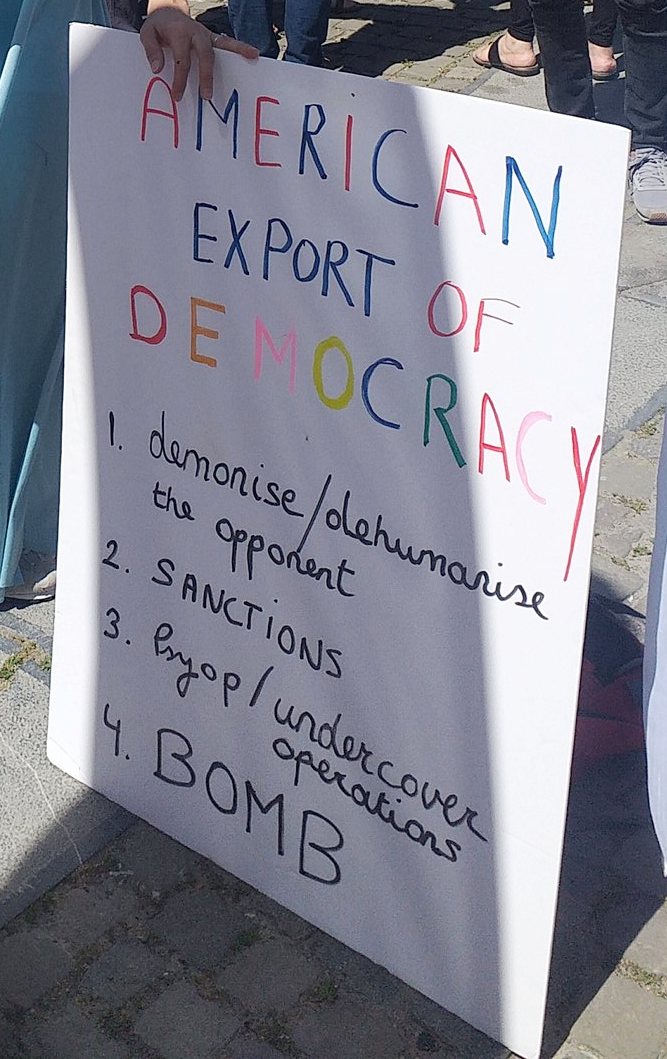 The Secretary
General of NATO made an effort to underline the importance of Europe and
North America working together and overcoming the differences that
became particularly acute during Trump's presidency. He said in
Washington that NATO has become “even more valuable" to the
United States, as it is a great advantage for the U.S. not to
have to confront the "security consequences" of China's rise and the
shifting global balance of power alone but together with the alliance's
29 other members. (In a similar vein, U.S. President
Joe Biden, upon his arrival in England on June 9, underlined his
support for NATO and set himself apart from his predecessor in remarks
made to U.S. troops at Royal Air Force
Mildenhall, saying that at the NATO summit he will make it clear that
"the United States commitment to our NATO alliance in Article 5 is rock
solid.")
The Secretary
General of NATO made an effort to underline the importance of Europe and
North America working together and overcoming the differences that
became particularly acute during Trump's presidency. He said in
Washington that NATO has become “even more valuable" to the
United States, as it is a great advantage for the U.S. not to
have to confront the "security consequences" of China's rise and the
shifting global balance of power alone but together with the alliance's
29 other members. (In a similar vein, U.S. President
Joe Biden, upon his arrival in England on June 9, underlined his
support for NATO and set himself apart from his predecessor in remarks
made to U.S. troops at Royal Air Force
Mildenhall, saying that at the NATO summit he will make it clear that
"the United States commitment to our NATO alliance in Article 5 is rock
solid.")
In making the case in support of the U.S. warmongering against China, Stoltenberg referred to the fact that the U.S. is no longer top dog in all domains, that China will soon surpass it in terms of the size of the economy. He said China is seeking to control critical infrastructure in NATO countries and around the world and is leading in some of the most important technologies, including parts of artificial intelligence and autonomous systems. He raised the alarm further saying China already has the second largest defense budget, the biggest Navy, and is investing heavily in advanced military capabilities. He did not need to add that for China to approach the military capacity of the U.S. would be intolerable for the "indispensable" power that heads up NATO. On the basis of this warmongering logic, ratcheting up war preparations is in order.
Related to this, Stoltenberg made clear that "burden sharing" remains on NATO's agenda as always -- meaning that NATO members must stay the anti-social course of increasing their military budgets until they account for at least two per cent of their national expenditures, no matter how much their debt and deficits have grown as a result of the pandemic and its attendant pay-the-rich schemes, or how much the peoples of their countries demand military spending be cut, not increased.
NATO's Values
Another problem with China is that it does not share NATO's values, Stoltenberg said. The values NATO claims to stand for have been expressed differently at different times and for different purposes. However upon signing the Cold War-era North Atlantic Treaty to become a member of NATO, a country affirms its commitment to safeguard "the freedom, common heritage and civilization of their peoples, founded on the principles of democracy, individual liberty and the rule of law....to promote stability and well-being in the North Atlantic area... [and] to unite their efforts for collective defence and for the preservation of peace and security."
 In
fact, NATO has never worked to preserve peace and security for
the
peoples of Europe, but to establish political and military structures
which would not permit people's empowerment. Its participation in at
least three U.S. wars of aggression (against Yugoslavia, Afghanistan
and Libya) provide whatever proof is required to show it is not a force
for peace or security. As for the rule of law, increasingly NATO speaks
less and less about the need to uphold international law and the rule
of law, referring instead to the need to defend and preserve "the
rules-based international order." The rule of law is based on
recognized public
standards for judging what is and is not acceptable, what is a crime
and the punishment for it. The fraud of what is
referred to as a "rules-based international order" is that there are
those who control the rules and exercise their own discretion about
what must be done to follow the rules and what the
punishments are for failure to abide by them. When the U.S. or U.S. and
NATO give themselves the right to enforce the rules they make and
impose on other countries, typically through coercive measures up
to and including military intervention to remove their governments,
they are acting in contempt of international law. Defence of the
rules-based international order that NATO has made the centrepiece of
its mission is the antithesis of the rule of law and amounts to nothing
more than might makes right.
In
fact, NATO has never worked to preserve peace and security for
the
peoples of Europe, but to establish political and military structures
which would not permit people's empowerment. Its participation in at
least three U.S. wars of aggression (against Yugoslavia, Afghanistan
and Libya) provide whatever proof is required to show it is not a force
for peace or security. As for the rule of law, increasingly NATO speaks
less and less about the need to uphold international law and the rule
of law, referring instead to the need to defend and preserve "the
rules-based international order." The rule of law is based on
recognized public
standards for judging what is and is not acceptable, what is a crime
and the punishment for it. The fraud of what is
referred to as a "rules-based international order" is that there are
those who control the rules and exercise their own discretion about
what must be done to follow the rules and what the
punishments are for failure to abide by them. When the U.S. or U.S. and
NATO give themselves the right to enforce the rules they make and
impose on other countries, typically through coercive measures up
to and including military intervention to remove their governments,
they are acting in contempt of international law. Defence of the
rules-based international order that NATO has made the centrepiece of
its mission is the antithesis of the rule of law and amounts to nothing
more than might makes right.
As for the democracy that NATO stands for, it is to impede any people vesting decision-making power in themselves. Today, when the fight is precisely for people's empowerment and for new arrangements so the people participate in governance and in setting the direction of the economy and of the foreign policy of their countries based on what favours them, NATO is in no position to give any nation lessons about democracy. Even within NATO there is no democracy. It claims that decisions taken by its North Atlantic Council, which are made on the basis of unanimity, with no voting taking place, and which all must accept, are “the expression of the collective will of all member countries."
It is time the taboo is ended on discussing all these matters, including the role the aggressive NATO alliance plays in the world, whether Canada should be a member of NATO or not, and whether NATO should even exist. Since NATO's founding in 1949 to the present there has been no discussion or debate allowed in Parliament on any of these things. Canada's membership in NATO is to be regarded as a fait accompli, end of story. Nor is there discussion about the fact that decisions are taken by NATO -- a supranational body -- then imposed on Canadians without any participation by Members of Parliament, much less the people of Canada.
Canadians, along with people in the U.S. and Europe are using the occasion of NATO's summit to hold actions and events such as counter-summits to have these much-needed discussions and make plans to build a movement calling for their countries to get out of NATO and for NATO to be dismantled. Join in!
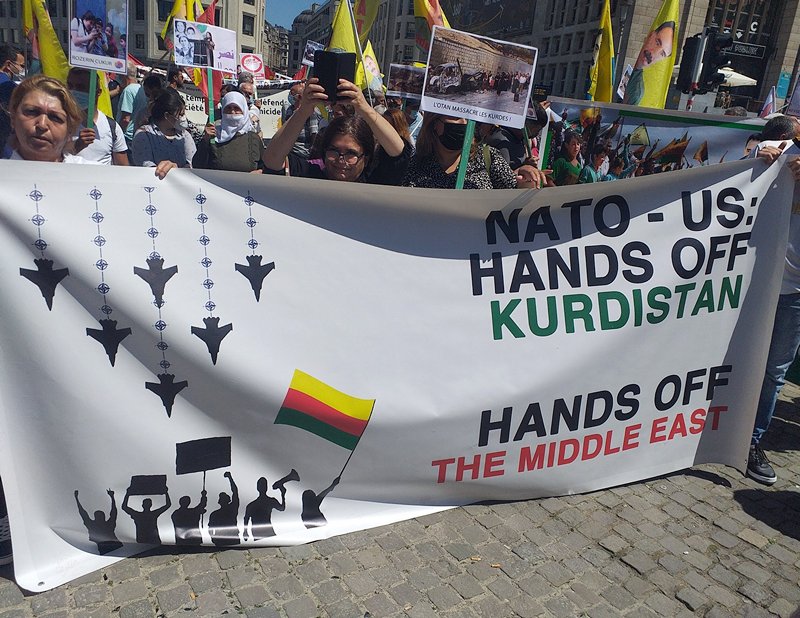

Brussels, June 13, 2021
(With files from U.S. Department of Defense, Asia Times, NPR. Photos: S. Nehirci, J.S. Forrest, L. De Brabander)
As U.S. Steps Up War Preparations Against China NATO Extends Its Reach to Asia Pacific
The largest naval war exercise in a generation is being prepared by the U.S. for later this summer. It is simply called Large Scale Exercise 2021 and will span both the European and Asia Pacific fields of operations. It will deploy about 25,000 U.S., NATO and Pacific Region personnel; aircraft carriers, submarines, aircraft and unmanned vessels, with the U.S. Marines commanding the Asia Pacific operations. To say that the political leaders gathered for the NATO Summit on June 14 are preparing for world war, is not to overstate the seriousness of the situation.
Australia, Japan, the Republic of Korea (ROK) and New Zealand have been "NATO partners" for some time now and participated for the first time in a NATO Foreign Ministerial Meeting in December 2020. Global expansion of NATO's field of operations is a key element of the NATO 2030 agenda, not only into the Asia Pacific Region, but Africa and Latin America as well.
The U.S. is driving this agenda but other NATO powers have their own interest in expanding into the Asia Pacific region, and are doing so both independently and in concert with other NATO member states. Of course it is all presented in the name of high ideals, of "human rights," upholding a "rules-based international order," the "rule of law" and so forth. In truth, it is about the liberal democracies that are part of the imperialist system of states, along with U.S. imperialism as the "indispensable" power, keeping the world, China and Russia in particular, subservient to U.S. dictate and so-called western interests.
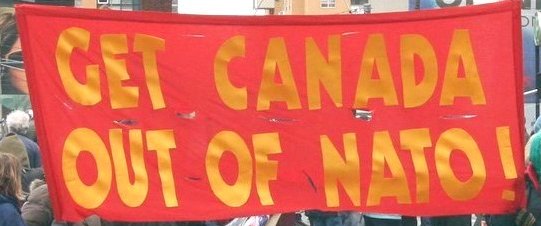 The
NATO Association of Canada (NAOC, part of NATO's political wing) put it
quite shamelessly in a recent article. It wrote: "President Biden
asserts that competition with China is
an imperative step for democracy, the rule of law and the rules-based
economic system to remain fundamentally for global stability and peace.
Nevertheless, the U.S.'s strategy also
accommodates American hubris in clinging to their remaining hegemonic
prestige in the Indo-Pacific and globally."
The
NATO Association of Canada (NAOC, part of NATO's political wing) put it
quite shamelessly in a recent article. It wrote: "President Biden
asserts that competition with China is
an imperative step for democracy, the rule of law and the rules-based
economic system to remain fundamentally for global stability and peace.
Nevertheless, the U.S.'s strategy also
accommodates American hubris in clinging to their remaining hegemonic
prestige in the Indo-Pacific and globally."
NAOC went on to point out that the UK has also been strengthening its security arrangements with Japan, Brunei and the former colonial states in Southeast Asia and the Western-Pacific, while France is using its overseas territories (Mayotte, La Réunion, New Caledonia and French Polynesia) to claim legitimacy for expanding its military presence, territorial and sovereignty claims in the Indo-Pacific.
No sooner was President Biden inaugurated than he began stepping up U.S. war preparations against China. The first international trips by Biden Cabinet officials saw Secretary of State Antony Blinken and Secretary of Defense Lloyd Austin travel to Japan and south Korea in March as part of an anti-China tour which culminated in the Alaska Summit with senior government officials of the People's Republic of China.
The tour was preceded by a virtual meeting on March 12 of heads of state of the Quadrilateral Security Dialogue (QSD -- known as the Quad) comprised of the U.S. India, Australia and Japan, where Biden secured a renewed commitment to "the Spirit of the Quad." To date it has been an informal alliance, initiated in 2007; however, when Mike Pompeo was Secretary of State he met with members of the Quad to push converting it into "an Asian NATO" with "shared security and geopolitical goals."
Secretary of State Blinken made it very clear on the outset of this tour in March just exactly what the U.S. means by preserving a "rules-based international order." Blinken said "China is the only country with the economic, diplomatic, military and technological power to seriously challenge the stable and open international system -- all the rules, values and relations that make the world work the way we want it to." (Emphasis added.)
In Japan on March 16, Blinken and Austin emphasized that the U.S. and Japan will work together to counter China's destabilizing efforts. China, they said, uses coercion and aggression against Hong Kong and Taiwan; abuses human rights in Xinjiang and Tibet, and asserts maritime claims in the South China Sea that violate international law. Japan stepped up to the plate and reiterated the U.S. claims against "China's aggressive actions in the Taiwan Strait" and territorial claims in the South China Sea.
The statements issued following their stopover in the ROK were less strident, on the ROK's part at least, but clever wording by the ROK to sidestep direct interference in China's affairs did not escape China's attention.
At the Alaska Summit -- that included the participation of Yang Jiechi, a member of the Political Bureau of the Communist Party of China's Central Committee and director of the Central Leading Group for Foreign Affairs, and China's Foreign Minister Wang Yi -- Blinken and Austin staged a media performance of confronting and lecturing China. The Atlantic Council, a think tank that is also part of NATO's political wing, hailed the performance as a vital step of the Biden Administration for making China realize the United States is "dealing from a position of strength."
The Chinese officials however responded that "in front of the Chinese side, the U.S. is not qualified to speak to China from a position of strength." Foreign Minister Wang said, "the old habit of U.S. hegemonic behaviour of willfully interfering in China's internal affairs must be changed." Chinese media described the Alaska Summit as "an unprecedented open face-to-face confrontation between China and the U.S." that will "very likely be given great importance in history."
Biden's "diplomacy" efforts in March were immediately followed by numerous military exercises in the region. Navies of the Quad countries joined for the first time in a three-day exercise called La Pérouse, April 5-7, spearheaded by the French Navy. This exercise was described with more of the same language about demonstrating "shared values with friendly navies ensuring freedom of seas and commitment to an open, inclusive Indo-Pacific and a rules-based international order."
Yet right after La Pérouse, the Commander of the U.S. Seventh Fleet issued a press release on April 7 stating that the "USS John Paul Jones asserted navigational rights and freedoms approximately 130 nautical miles west of the Lakshadweep Islands, inside India's exclusive economic zone (EEZ) without requesting India's prior consent, consistent with international law" and that it was intended to challenge India's "excessive maritime claims." According to Indian media, India was shocked that the U.S. would issue such a press release.
Although the U.S. has frequently conducted surveillance and intelligence gathering in India's EEZ this was the first time a public statement had been made by the U.S. to justify an aggressive action to challenge India's claims of sovereignty over its own territorial waters. It is noteworthy that India signed onto the UN Convention of the Law of the Sea (UNCLOS) in 1995. UNCLOS specifically states that "the provisions of the Convention do not authorize other States to carry out in the exclusive economic zone and on the continental shelf military exercises or manoeuvres, in particular those involving the use of weapons or explosives without the consent of the coastal State."
The U.S. has not signed UNCLOS declaring that it is not in its national interest to do so. The U.S. Department of Defense (DoD) Freedom of Navigation protocol declares that friend or foe "the DoD challenges excessive maritime claims asserted by a wide variety of coastal States including allies, partners, and other nations on a worldwide basis to maintain global mobility of U.S. forces."
The example shows that the "rules-based international order" the U.S. and NATO enforce is in violation of international law. Rules are made up by the U.S. "that make the world work the way we want it to."
In mid-April the USS Theodore Roosevelt Carrier Strike Group and the Makin Island Amphibious Ready Group of the U.S. Pacific Fleet carried out "expeditionary strike force operations" in the South China Sea. The operation was on such a large scale it was noticed throughout Asia as a major provocation against China. China has been responding in kind with naval exercises of its own.
Besides the French Naval exercise which the Quad countries joined for the first time, Britain too is stepping up its military presence in the Asia Pacific region. On May 1, the UK Carrier Strike Group 21 set off to participate in the NATO "Exercise Strike Warrior" in the North Sea, which involved more than 20 warships, three submarines and 150 aircraft from 11 different nations, after which it departed for Asia Pacific. British Defence Secretary Ben Wallace said, "When our Carrier Strike Group sets sail it will be flying the flag for Global Britain -- projecting our influence, signalling our power, engaging with our friends and reaffirming our commitment to addressing the security challenges of today and tomorrow .... the UK is not stepping back but sailing forth to play an active role in shaping the international system of the 21st Century."
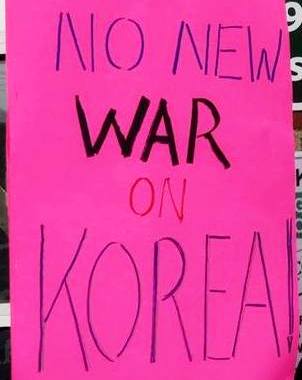 Another
U.S. escalation of war preparations is the scrapping of missile
guidelines which was the result of the Biden-Moon Summit in May. The
ROK is no longer under any restriction
as to range or payload of its missile systems. This is what the Rand
Corporation, another war mongering U.S. "think tank" has been proposing
as a cornerstone of Biden's Korea policy.
Rand Corp. issued a paper at the start of this year advising: "The
response by the United States and the ROK should be to bolster
deterrence credibility by 1) delaying the transfer of
wartime operational control (OPCON) [which would mean the U.S.
retains control of any ROK missile systems -- TML Ed. Note]
and 2) implementing ballistic missile defence and
other forms of defence. However if these combined responses turn out to
be unsuccessful, the ROK might need to consider developing and
deploying indigenous nuclear weapon
capabilities."
Another
U.S. escalation of war preparations is the scrapping of missile
guidelines which was the result of the Biden-Moon Summit in May. The
ROK is no longer under any restriction
as to range or payload of its missile systems. This is what the Rand
Corporation, another war mongering U.S. "think tank" has been proposing
as a cornerstone of Biden's Korea policy.
Rand Corp. issued a paper at the start of this year advising: "The
response by the United States and the ROK should be to bolster
deterrence credibility by 1) delaying the transfer of
wartime operational control (OPCON) [which would mean the U.S.
retains control of any ROK missile systems -- TML Ed. Note]
and 2) implementing ballistic missile defence and
other forms of defence. However if these combined responses turn out to
be unsuccessful, the ROK might need to consider developing and
deploying indigenous nuclear weapon
capabilities."
International affairs critic Kim Myong Choi succinctly pointed out that the international community should concern itself with the grave and provocative acts conducted in plain sight by the U.S. rather than fixating on the measures the Democratic People's Republic of Korea (DPRK) has to take to defend itself from U.S. aggression. The DPRK notes that the U.S. and the ROK carried out 110 war exercises of varying scales in 2018, more than 190 in 2019 and 170 in 2020.
Since Biden's inauguration, U.S. war preparations, especially in the Asia Pacific region against China, are escalating and pose a grave danger to the peace and security of the region and of the world. Platitudes about "an open rules-based order" are nothing but the dictum that "might makes right." We must step up the struggle against the danger of war, to affirm the right to be of all nations and peoples of the world, and to renew international relations on a modern proletarian internationalist basis.
Britain Launches Biggest
Deployment of
UK Naval and Aerial Military Firepower
Since 1982 Falklands War
Britain has launched its biggest deployment of UK naval and aerial military firepower since the 1982 Falklands War. The massive deployment is headed toward the Mediterranean, the Indian Ocean and Asia Pacific regions. The aircraft carrier HMS Queen Elizabeth is heading a carrier strike group (UK Carrier Strike Group 21, also known as Operation Fortis) that departed on a 28-week mission on May 24. It is a NATO-backed mission, British Defence Secretary Ben Wallace said. Its purpose, he said, is for the UK to "[project] our influence, [signal] our power." More specifically, the Ministry of Defence states that the deployment is part of the "UK's tilt to the Indo-Pacific region" which it claims is to "bolster deep defence partnerships" in the region.
The Carrier Strike Group includes a squadron of 10 U.S. Marine Corps F-35 jets, an attack submarine armed with Tomahawk missiles, two destroyers, a number of other battleships and the greatest quantity of helicopters assigned to a single UK Task Group in a decade. The strike group will stop at more than 100 ports in over 40 countries for more than 70 engagements. The last leg of the voyage will take the strike group into the South China Sea, close to Taiwan and end with military exercises with Japan.
In May, prior to its departure for Asia, the Carrier Strike Group 21 took part in massive war games dubbed "Exercise Strike Warrior" in the waters off northwest Scotland. At that time, the Defence Secretary claimed: "When our Carrier Strike Group sets sail next month, it will be flying the flag for Global Britain -- projecting our influence, signalling our power, engaging with our friends and reaffirming our commitment to addressing the security challenges of today and tomorrow ... the UK is not stepping back but sailing forth to play an active role in shaping the international system of the 21st Century."
The Carrier Strike Group 21 was deployed in the lead-up to the G7 meeting hosted by Britain, which Britain claimed to be "the most prominent group of democratic countries." Sending a battle fleet to Asia for the first time since the start of the Korean War in 1950, giving its support to NATO operations in the Black Sea and entering the South China Sea to bolster U.S. provocations there are unmistakably dangerous military provocations. "Flying the flag of Global Britain" is a desperate crisis-ridden policy according to which military spending and war preparations can succeed in imposing the so-called shared values of the imperialist democracies onto the peoples of Asia. This will not be the case. Already, the wars of the 20th century have proven that it is not military might which prevails but the peoples united behind the cause of humankind for freedom, democracy, peace and justice.
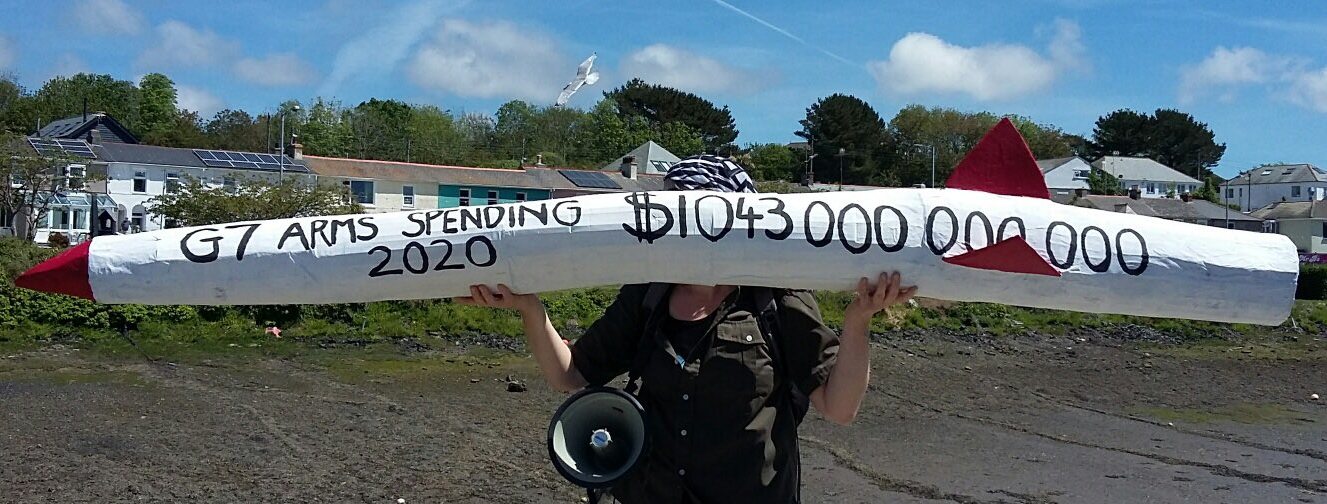
Protest at G-7 summit in Cornwall, June 12, 2021
(Photos: CND, A. Balker)
For Your Information
Current NATO Missions
The following are current NATO missions.
Kosovo
There are approximately 3,500 troops from NATO and "partner" countries operating in Kosovo as part of NATO's Kosovo Force (KFOR). NATO has had troops stationed in Kosovo since June 1999 after taking part in the U.S.-led air war against the former Yugoslavia.
Afghanistan
NATO is currently leading Operation Resolute Support, in effect since January 2015. It is described as a "non-combat mission which provides training, advice and assistance to Afghan security forces and institutions." NATO says the legal basis of its mission rests on a formal invitation of the Afghan government and the Status of Forces Agreement (SOFA) between NATO and Afghanistan signed in the wake of the U.S.-led war and occupation. In April it was announced that the U.S. and other allied forces would be withdrawing from Afghanistan, a process expected to be completed "within a few months." NATO troops and those of 36 "partner countries," which currently total around 10,000, will remain behind, as part of what NATO says is an "enduring partnership" it has committed to with Afghanistan.
Iraq
The NATO Mission Iraq was launched at the Brussels Summit in July 2018, "at the request of the Iraqi government" and "in coordination with the Global Coalition to Defeat ISIS." NATO says it is a "non-combat training and capacity-building mission to assist Iraqi forces to secure the country and the wider region against terrorism, and prevent the re-emergence of ISIS." Canada led the mission for the first two years. In February 2021 it was announced that NATO defence ministers had agreed to raise the number of troops for the mission from 500 to 4,000.
Eastern Europe/Baltic Region
NATO has what it calls an Enhanced Forward Presence in the form of four multinational combat-ready battle groups based in Estonia, Latvia, Lithuania and Poland. These battle groups are led by the United Kingdom, Canada, Germany and the United States respectively. The battle group Canada commands is comprised of approximately 1,400 troops. Canada's Department of National Defence says that "these battle groups make clear that an attack on one Ally will be considered an attack on the whole Alliance, and represents the biggest reinforcement of NATO's collective defence in a generation." Despite claims of self-defence, these troops are part of U.S.-NATO aggression toward Russia.
Mediterranean Sea and Black Sea Standing Naval Forces
NATO has four multinational integrated Standing Maritime Groups with an immediate-response capability. Routine NATO maritime operations in the region include such things as situational awareness (aimed primarily at monitoring Russian activity) and counter-terrorism at sea. If decided by NATO members the mission could also perform other tasks described as upholding freedom of navigation, conducting maritime interdictions and protecting critical infrastructure. NATO also runs a "maritime and joint exercise program" which it says is key to interoperability and improving core warfighting competencies. Its maritime groups operate jointly with U.S warships and those of other countries as well, including Canada.
Air Policing
Ballistic Missile
Defence
Africa
Since June 2007, NATO has provided air- and sealift support to a mission of the African Union (AMISOM) involved in what it calls peacekeeping in Somalia. It also provides capacity-building and training to the African Standby Force (ASF) intended for "deployment in Africa in times of crisis." NATO says it has some similarities to its own Response Force, which it describes as "a highly ready and technologically advanced, multinational force made up of land, air, maritime and Special Operations Forces (SOF) components that the Alliance can deploy quickly, wherever needed."
(NATO.int, DND)
NATO 2030
 NATO 2030 is the main focus of this year's NATO Summit. It is a series
of proposals from Secretary General Jens Stoltenberg to set NATO's
future direction into 2030,
whose purpose is to "make sure NATO remains strong militarily, becomes
even stronger politically and takes a more global approach." These
proposals are said to have come from
consultations with an expert group appointed by Stoltenberg, 14 "Young
Leaders," said to be career professionals aged 25-35 from NATO
countries, "Allied parliamentarians, civil society, public and private
sector experts."
NATO 2030 is the main focus of this year's NATO Summit. It is a series
of proposals from Secretary General Jens Stoltenberg to set NATO's
future direction into 2030,
whose purpose is to "make sure NATO remains strong militarily, becomes
even stronger politically and takes a more global approach." These
proposals are said to have come from
consultations with an expert group appointed by Stoltenberg, 14 "Young
Leaders," said to be career professionals aged 25-35 from NATO
countries, "Allied parliamentarians, civil society, public and private
sector experts."
The alliance website calls NATO 2030 "A transatlantic agenda for the future," which is divided into nine major areas. The excerpts below give a sense of how NATO seeks to further militarize all aspects of society and impose the U.S. imperialist agenda:
I. Deepen political consultation
"[...] NATO will strengthen its role as the indispensable platform for transatlantic consultations on security and defence."
II. Strengthen deterrence and defence
"Since 2014, the Alliance has implemented the biggest reinforcement of its collective defence in a generation, including with more forces at higher readiness and new deployments on Allied territory. At the Summit, NATO Leaders will take decisions to further enhance NATO's ability to deter and defend against any potential adversary, therefore improving the Alliance's readiness, responsiveness and ability to reinforce."
III. Enhance resilience
"A broadened approach to security means a stronger focus on resilience, including infrastructure, supply chains and communications. Resilience is NATO's first line of defence and is essential for the Alliance to successfully fulfil its three core tasks of collective defence, crisis management and cooperative security. It is key to push back potential adversaries who use military, political and economic tools to weaken the societies and undermine the security of Allies. Resilient civilian services and infrastructure are also essential for Allied military forces to operate effectively in peace, crisis or conflict -- or during a global pandemic, as is currently the case."
IV. Sharpen technological edge
"Technological innovations are changing the nature of peace, crisis and conflict. In a world of growing geopolitical competition, NATO Allies can no longer take their technological edge for granted. As the indispensable forum for transatlantic cooperation on all security-related aspects of emerging and disruptive technologies, NATO is determined to stay ahead of the curve. In recent years, Allies have identified seven key emerging and disruptive technologies: artificial intelligence, data and computing, autonomy, quantum-enabled technologies, biotechnology, hypersonic technology and space. They have also agreed an implementation strategy that sets out ways in which NATO can work with partners, academia and the private sector -- including start-ups -- to develop new technologies more quickly and strengthen the industrial base.
"As part of NATO 2030, the Secretary General has proposed to establish a new transatlantic defence innovation accelerator to foster more transatlantic cooperation on critical technologies and maintain the ability of Allies to work together. The accelerator will also help to better harness civilian innovation by working even more intensively together with partners, academia and the private sector -- especially start-ups -- to adapt to and adopt new technologies more quickly."
V. Support rules-based international order
"When it comes to upholding the rules-based international order, countries like Russia and China do not share the Alliance's values. They are at the forefront of a pushback against that order. This has implications for the security, values and democratic way of life of Allied countries. To remain successful and ensure the defence and security of the Euro-Atlantic area, NATO should play a greater role in preserving and shaping the rules-based international order in areas that are important to Allied security. This includes by speaking with one voice in defence of shared values and interests. As part of NATO 2030, Allies will also take decisions to deepen NATO's relationships with like-minded countries and international organizations near and far, including in the Asia-Pacific."
VI. Boost partner training
"When NATO's neighbours are more stable, NATO is more secure. Years of experience have taught the Alliance that prevention is better than intervention. NATO must always remain ready to deploy troops to manage crises when necessary. However, such operations are costly and difficult to sustain and do not necessarily address the underlying factors contributing to insecurity and instability.
"Strengthening partners and training local forces is a more sustainable and cost-effective way to address insecurity, build stability and fight terrorism."
VII. Combat climate change
"NATO has recognized climate change as a security challenge for many years. In the Sahel, drought has fuelled conflict, driven migration and helped create the conditions for terrorism. In the Arctic, melting ice could lead to new geopolitical tensions.
"In March, Allies agreed a new Climate Change and Security Agenda and NATO is now developing an ambitious action plan on climate change for the Summit.
"There are three areas where NATO has an important role to play. It will aim to set the gold standard on understanding, adapting to and mitigating the security implications of climate change by: monitoring and tracking climate change much more closely assessing the impact on assets and installations Alliance-wide; and reducing military emissions to contribute to the goal of Net Zero."
VIII. The next Strategic Concept
"NATO's current Strategic Concept was agreed in 2010 and has served NATO well. Nonetheless, the world has fundamentally changed in the past decade. That is why the time has come to adapt NATO for an increasingly contested and unpredictable security environment.
"At the Summit, NATO Leaders will formally ask the Secretary General to steer the process for NATO's next Strategic Concept. It will take account of NATO's significant military and political adaptation since 2014 and recognize new realities. It will also be an opportunity to recommit to shared values and chart a common course for the future."
IX. Invest in the Alliance
"Taking forward the ambitious and forward-looking NATO 2030 agenda will require continued investment in collective defence. The Alliance is already on the right track, with seven consecutive years of increases in defence spending by European Allies and Canada. It will be important to keep this momentum. At the same time, Allies are also discussing how to invest more together, in NATO, so that they can do more together. Because pooling resources is a force multiplier and an effective way to boost common security. Common funding also sends a powerful message of unity and resolve -- both to Allied citizens and to any potential adversary."
(www.nato.int)
Law of Uneven Development and Calculating Strengths of Contending Powers
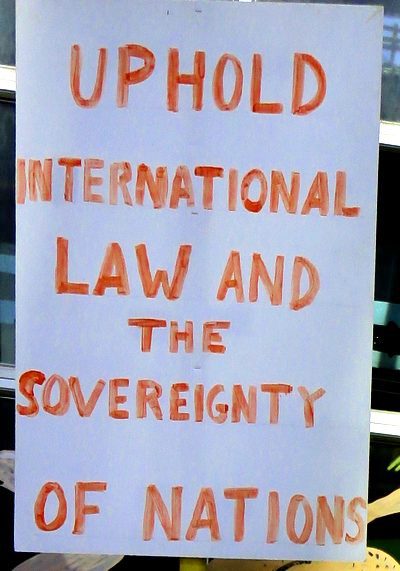 U.S. claims of
superiority involve the role of the military
and the creation of the military bureaucracy, which were both greatly
expanded during and after World War II, including the massive
productive
forces and bureaucracy needed for building nuclear weapons. The
national security apparatus also got formed, including the CIA, the
National Security Council, the Defense Department, and the Joint
Chiefs of Staff which represent all branches of the military in an
effort to unite them. The rationale given at that time was that to
operate in
an international order it is necessary to be able to give a precise
measure of the strengths of all the contending powers. Everything has
to be made in some sense intelligible, or measurable, in order to
make the calculation they claim is required of relative strengths of
all
the powers.
U.S. claims of
superiority involve the role of the military
and the creation of the military bureaucracy, which were both greatly
expanded during and after World War II, including the massive
productive
forces and bureaucracy needed for building nuclear weapons. The
national security apparatus also got formed, including the CIA, the
National Security Council, the Defense Department, and the Joint
Chiefs of Staff which represent all branches of the military in an
effort to unite them. The rationale given at that time was that to
operate in
an international order it is necessary to be able to give a precise
measure of the strengths of all the contending powers. Everything has
to be made in some sense intelligible, or measurable, in order to
make the calculation they claim is required of relative strengths of
all
the powers.
These efforts at calculating strengths are the U.S. response to a law of social development that is independent of their will, the law of uneven development. Lenin said all powers make a calculation of all other powers and themselves. It has to be something which can be calculated using things like levels of productivity, armed forces, morale, etc. In making such calculations, the rulers contend with what is necessarily a measure of strength that is unequal because of historical developments, like uneven economic development and such things, which are independent of their will. This is a different way of looking at the matter than histories coming out now from the Quincy Institute on Responsible Statecraft, for example, which say the U.S. planned to become a world superpower even before World War II. These think tanks all give different considerations of U.S. policy objectives, which have nothing to do with what states are compelled to do, independent of their will, which is to come up with a measure of strength of the contending powers and ways to test that measure. One of the main ways used to test that measure is brinkmanship. Brinkmanship refers to the practice of a country pushing another country or dangerous conflict or event to the limits, to assess responses and in hopes of achieving the outcome which it sees as favourable to itself.
The conceptions of national interest and security developed by the U.S. were not based on the sovereignty of nations big or small or similar UN standards, but on their "rules-based international order." This is what is currently being pushed by the U.S.-led aggressive war alliance, NATO, and explains its brinkmanship in the Mediterranean and the Asia-Pacific region. The high ideals of peace, democracy, human rights and economic prosperity can no longer cover up the open declaration of U.S. intent to dominate no matter what tensions this creates. The brinkmanship poses a very real danger of wars breaking out. The basis of the conception of self-defence promoted not only by NATO but also by the U.S. and Israel serves their claims to be defending their place within their so-called rules-based international order.
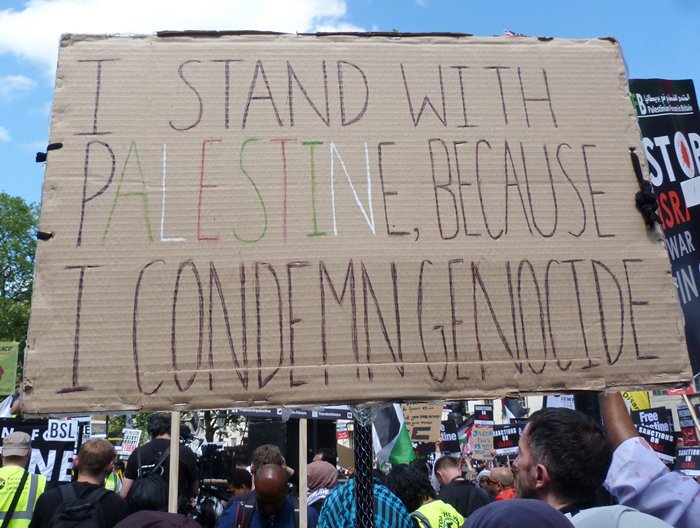 World
public opinion points out that the claims make no sense. For example,
as concerns Israel, international conventions and international law
make clear that the occupier cannot claim self-defence against the
occupied. This is recognized in world public opinion. It includes the
right of those who are colonized to oppose the colonizers using
force.
World
public opinion points out that the claims make no sense. For example,
as concerns Israel, international conventions and international law
make clear that the occupier cannot claim self-defence against the
occupied. This is recognized in world public opinion. It includes the
right of those who are colonized to oppose the colonizers using
force.
When world public opinion agrees with a moral standard that the occupier cannot claim self-defence against the occupied, that is public opinion agreeing with a standard established, a standard that also opposes genocide. The U.S. and Israel, with a perverse twist, instead insist they have the right to self-defence based on their so-called rules-based international order. According to them, there are rules which are independent of public opinion. It is like saying that a ruler that measures length, or a clock that gives a precise measure of time, count for nothing. Despite what they say, the fact remains that the measures of length, time or distance are not a matter of opinion. They exist as a public standard, notwithstanding the fact that different standards are used depending on the country, the traditions and so on which give us hectares or acres or arpents or dunums, and so on. The U.S. and Israel claim that a rule exists which is independent of public opinion, and that this rule justifies self-defence against what they decide is an "existential" threat, a future threat.

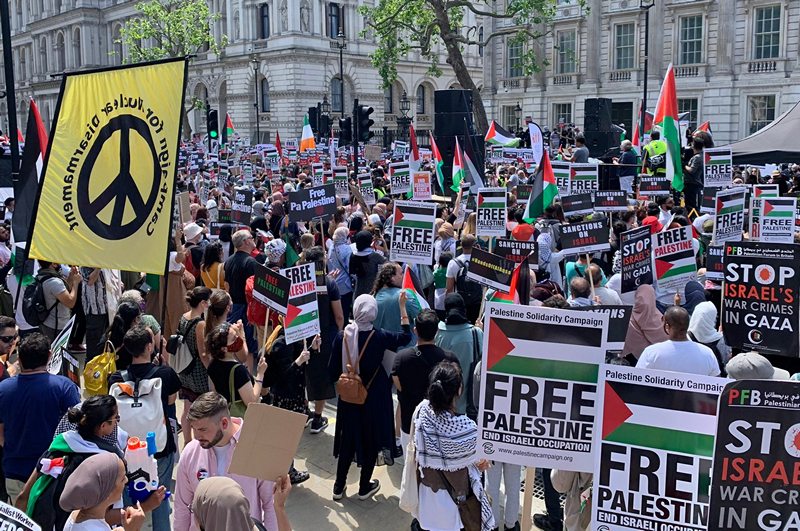
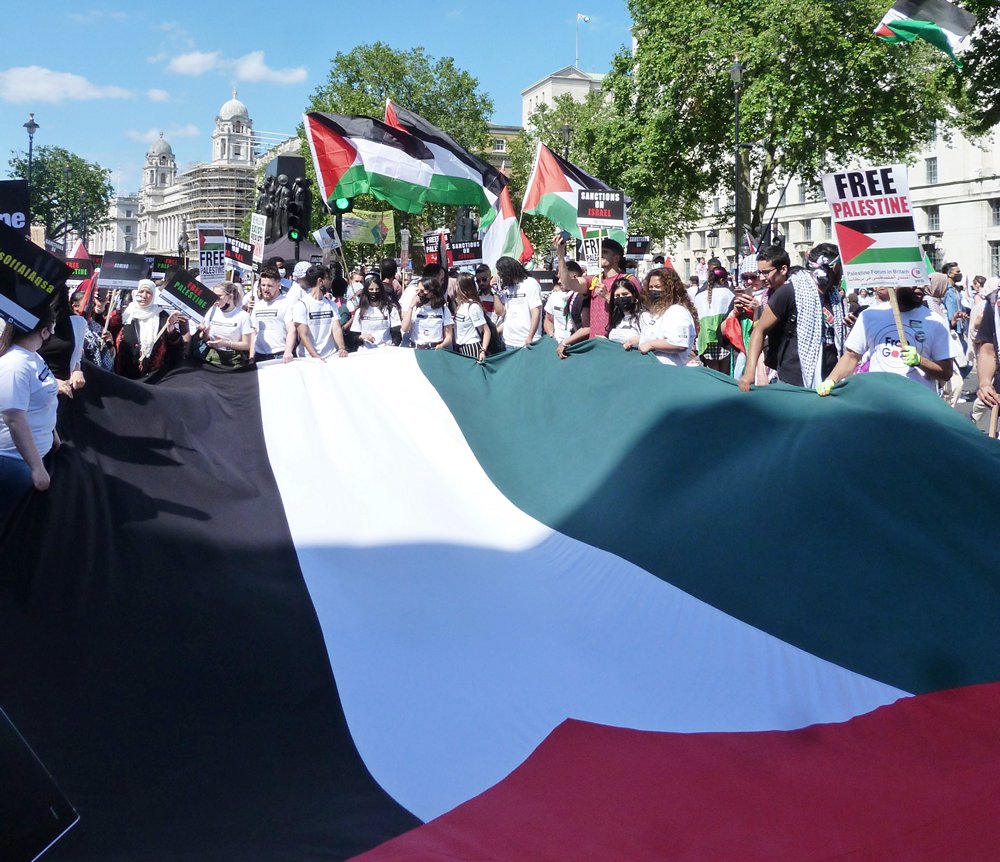
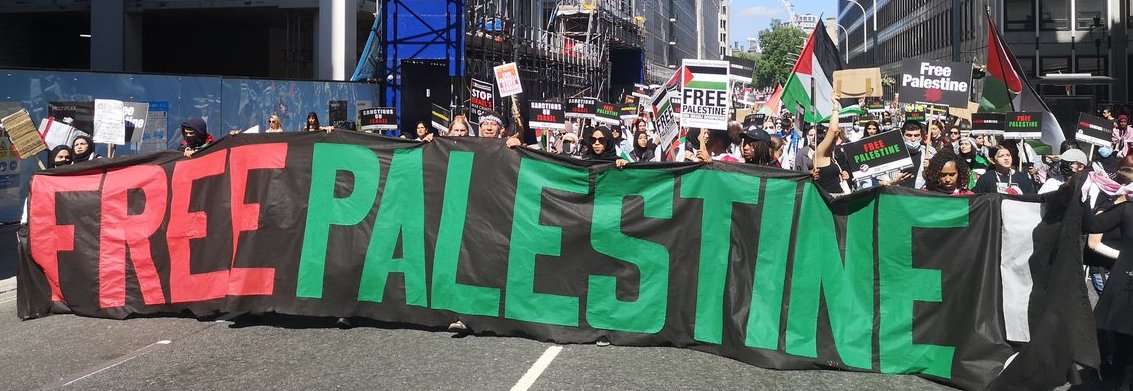

Public
opinion stands with Palestine, as seen in the march for justice for
Palestine held in London as part of the Resist G7 day of action for
international justice, June 12, 2021.
Blinken also says that no course of action can be determined by the rule, because every course of action can be made out to agree with the rule, which is what the U.S. does all the time. However they choose to determine things, such as self-defence, if they do it their actions are in agreement with the rule, but not if someone else does it. This is commonly called a double standard. The answer given by the U.S. to accusations that it is using double standards is that if everything can be made out to agree with the rule, it can also be made out to conflict with it. The valid conclusion from this is that there is no such thing as agreement with the rule or existence of the rule itself because it is whatever those in a position of power to judge say it is. This is widely evident in U.S. actions toward Palestine, as well as in the police killings across the U.S. and decisions not to charge the members of a police force and police agencies involved and so on. So too in the case of countries whose arguments and policies are based on the same imperialist logic.
The world established the standard that the occupier, in this case Israel, cannot claim self-defence against those occupied. The perversion by the U.S., as the ruler using U.S. rules, declares that the occupier can claim self-defence. The U.S. has been doing this since World War II. Its creation of the CIA, military bureaucracies, etc. are all part of their so-called rules-based international order.
What is perverse in all this goes back to the period of 1945 and the Cold War. The conception given among the circles that were establishing this so-called rules-based international order and working out the development of the military-industrial complex, purposely did not mention anything about the defeat of fascism and its significance and effect on world developments. Their conception is ahistorical. The U.S. rulers were sorting out that the militarization of the economy involves a complex, which is a special feature of life said to reach into every cell of life. President Eisenhower put it this way in 1961, after the military-industrial complex was established: "Now this conjunction of an immense military establishment and a large arms industry is new in the American experience. The total influence -- economic, political, even spiritual -- is felt in every city, every Statehouse, every office of the Federal government. We recognize the imperative need for this development."
The ruling circles decided a vast establishment was needed for further development of nuclear weapons, for becoming a superpower. The U.S. said the military-industrial complex was brought into being because of challenges from the USSR. Their so-called rules-based order stems from the complexity of this military-industrial complex involving the merger of the military and what becomes a huge military bureaucracy, with industry, which was itself merged with the international institutions of finance capital coming out of World War II, like the International Monetary Fund and World Bank. Referring to the merger for the development of finance capital, which itself is a merger of industrial and banking capital, one economist quipped that the IMF and World Bank had a basement office in the Pentagon. All of this is what made it a complex. It is this complex that has to be controlled in terms of influence in what Eisenhower termed the councils of power.
Eisenhower is often quoted saying he opposed the military-industrial complex. He is in fact speaking to how it must be controlled; how the striving of the vying factions within it must be controlled. He also puts it in the context of national security and disempowering the people. He said: "In the councils of government, we must guard against the acquisition of unwarranted influence, whether sought or unsought, by the military-industrial complex. The potential for the disastrous rise of misplaced power exists and will persist. We must never let the weight of this combination endanger our liberties or democratic processes. We should take nothing for granted. Only an alert and knowledgeable citizenry can compel the proper meshing of the huge industrial and military machinery of defence with our peaceful methods and goals, so that security and liberty may prosper together." This is the same meaning as conveyed when Biden says "we the people" are the government.
The conception forced down peoples' throats is that there is a superior opinion and a superior judgment that can be made by those who are superior and their judgment must be accepted. This is commonly used when state secrets are invoked, and claims made of espionage, or targeted assassinations are carried out, all in the name of national security.
(Photos: J. Jezek, Stop the War, Frinds of Al Aqsa, A. Hadi, Brighton PAlestine Solidarity Campaign)
(To access articles individually click on the black headline.)
Website: www.cpcml.ca Email: editor@cpcml.ca




